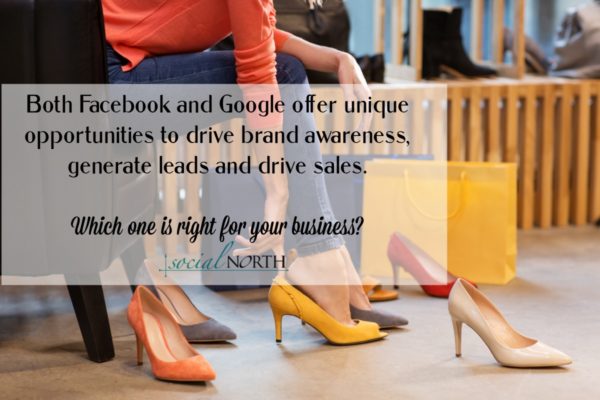Which ad platform will deliver the best results for your business?
 When social media was in its fledgling days – a growing force but still young and wild – getting found online was more about ingenuity than marketing. Social media experts popped out of nowhere, experts only by their ability entice followers on their chosen social media platform. But the online world has evolved to a sophisticated marketing machine fueled by increasingly large ad budgets. And in this “pay to play” world, knowing where to invest your advertising dollars has never been more complicated – and frustrating.
When social media was in its fledgling days – a growing force but still young and wild – getting found online was more about ingenuity than marketing. Social media experts popped out of nowhere, experts only by their ability entice followers on their chosen social media platform. But the online world has evolved to a sophisticated marketing machine fueled by increasingly large ad budgets. And in this “pay to play” world, knowing where to invest your advertising dollars has never been more complicated – and frustrating.
While there’s no denying Instagram and TikTok are wildly popular, Facebook is still the reigning queen of social media – and the ad platform of choice for many businesses. It’s where their ideal customer hangs out (or at least scrolls) and where they’ve built an online community. Taking all that organic goodness and applying some ad dollars simply makes good business sense.
What’s the difference between Facebook & Google advertising?
- Facebook Ads is simply a paid platform of ads on the network, whether you’re boosting a post or running dark ads to drive traffic to your Facebook page or to a page on your site.
- Google Ads are search and display, operated on a pay-per-click model (like Facebook). But they target customers differently and often at a different stage in buying process.
For many online marketers, it’s an “either or” proposition when it comes to where to invest their advertising dollars. But instead of seeing the platforms as competitive, looking at them as complimentary changes things. Because they touch consumers at different points, using them both in tandem can offer your business unique benefits.
Begin with your advertising goals
Before investing, outline what you want your campaign(s) to accomplish. Are you aiming for increased brand awareness – letting people in your community know who and where you are and what you sell? Do you want to generate leads for your sales force? Maybe it’s all about the final sale – direct sales from the customers you reach.
- Google Ads are especially effective for “demand capture” – attracting customers with a high intent to purchase soon. Chances are if a customer is searching for a specific product – like a blue 7.5’ patio umbrella – they’ve already done their research and they’re narrowing down where to buy.
- Facebook Ads, on the other hand, are especially effective for reaching customers at the top of the sales funnel. They’ve clicked on similar products on other Facebook ads so they’re you’re target customer – but they’re still in the “search and learn” phase.
A closer look at Google Ads
Google advertising is based on keywords. You’ll need to know which keywords will draw in the buying customer and from there, understand the competitiveness of those keywords – the price you’ll pay for each click. For example, a monthly budget of $1,000 with a Cost Per Click (CPC) of $15 will deliver approx. 66 clicks. From there, understanding how many will convert to buying customers will give your customer acquisition cost.
 Certain keywords indicate a high intent to purchase, which can drive up the price of those keywords. For example, a search that contains “best hybrid mattress price” or “hybrid mattress best price” shows the searcher has narrowed their choice of mattress and is now hunting for a retailer where they can buy. Add a brand name to that search query and it’s likely the buyer will make a purchase within 48 hours. If you’re at the bottom of the funnel – ready to service and convert the searcher into a buyer, this might be the best platform for your advertising dollars.
Certain keywords indicate a high intent to purchase, which can drive up the price of those keywords. For example, a search that contains “best hybrid mattress price” or “hybrid mattress best price” shows the searcher has narrowed their choice of mattress and is now hunting for a retailer where they can buy. Add a brand name to that search query and it’s likely the buyer will make a purchase within 48 hours. If you’re at the bottom of the funnel – ready to service and convert the searcher into a buyer, this might be the best platform for your advertising dollars.
In 2019, Google stated that every dollar spent on a Google ad generated $8 in profit. While the platform has evolved from a text-based CPC model to a customer-centric ethos, bidding is only the first step in the war to win the customer. Your keyword bid needs to get you on the first page – not necessarily at the top – but it’s your ad’s relevance to the keyword in the user’s search query gets you the ultimate click.
If you’re new to Google advertising, begin by looking at how your competitors use Google. Search products they sell and look closely at their keywords, their ad creative and buying process on their site. This competitive intelligence will help create an effective strategy for your business.
Facebook advertising
Facebook is favorite platform for many marketers, not only because it delivers an exceptional ROI (double more than Google in some cases) but it’s also easier to navigate and chose a target audience. Rather than bidding on keywords like Google, Facebook allows you to target your audience in granular detail: behaviors (like favorite TV shows), income and education levels, interests and hobbies and, of course, age, gender and location.
What’s more, you can also create “look-alike” audiences to further your reach. For example, if you’re having success with a group of people who watch HGTV, Facebook can help you find other people in your target location who may engage with similar habits, such as Magnolia Network followers. In short, Facebook allows for a much more targeted approach to help you find more customers.
By applying what you know about your Facebook community to an advertising campaign, you can learn a lot of detailed information about the habits and behaviors of people who may be interested in your products. And competitive intelligence is important here too. Search your competitors and look closely at the visual quality of their ads, as well as post frequency, content mix, community engagement and response time from their page manager.
Both Facebook and Google offer unique opportunities to drive brand awareness, generate leads and drive sales. If you’re new to the world of online advertising, there’s a lot to consider. Are you targeting the right customer? Is your ad creative engaging enough – with the right call to action? How much should you spend? The good news is that there’s room to learn and grow in this ever-evolving online advertising world.
 If you’re struggling with your digital strategy, I’d love to hear your questions and how I can help. Drop a comment below or shoot me an email and let’s start talking.
If you’re struggling with your digital strategy, I’d love to hear your questions and how I can help. Drop a comment below or shoot me an email and let’s start talking.
In the meantime, these posts might help you begin your content marketing journey:


Latest comments